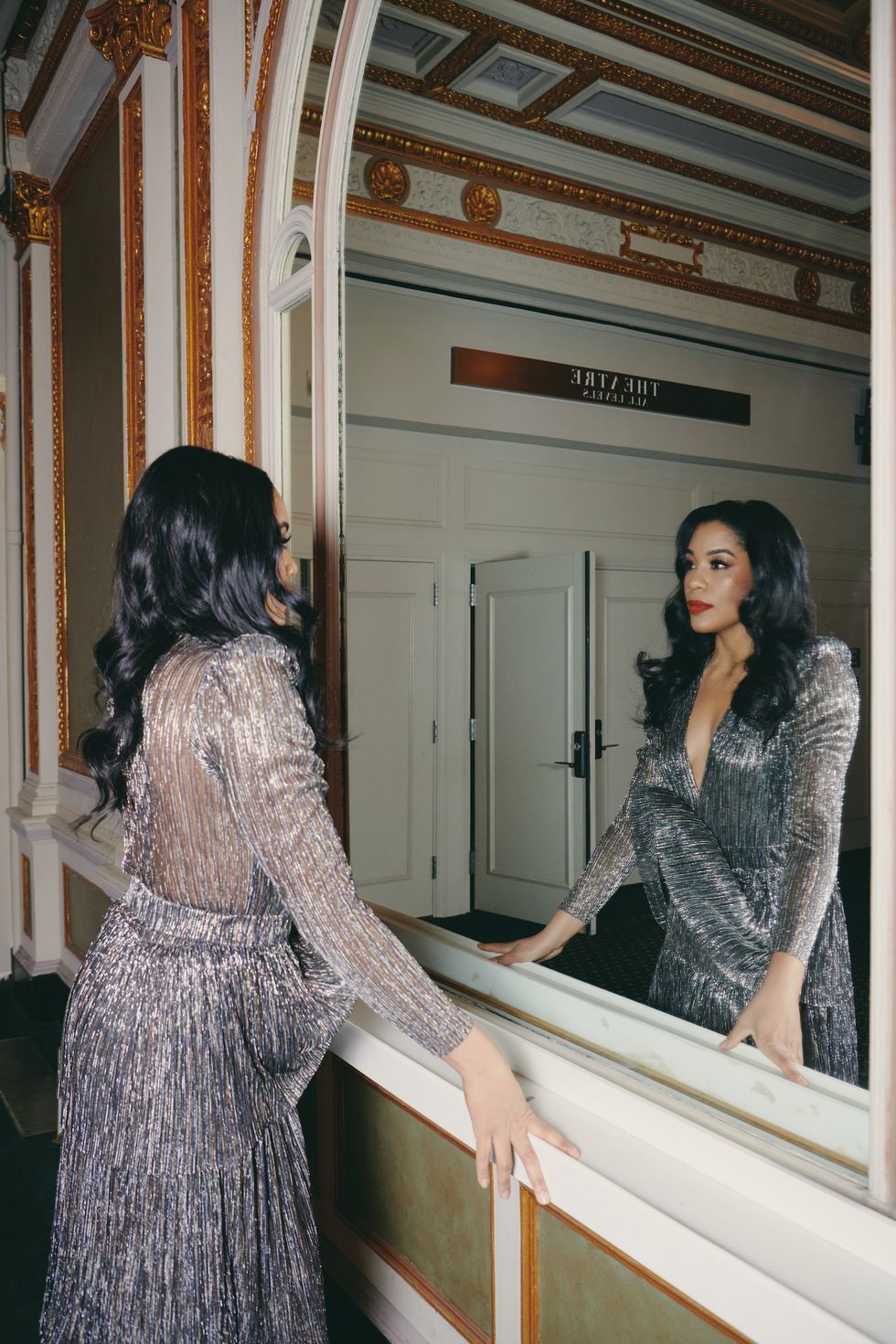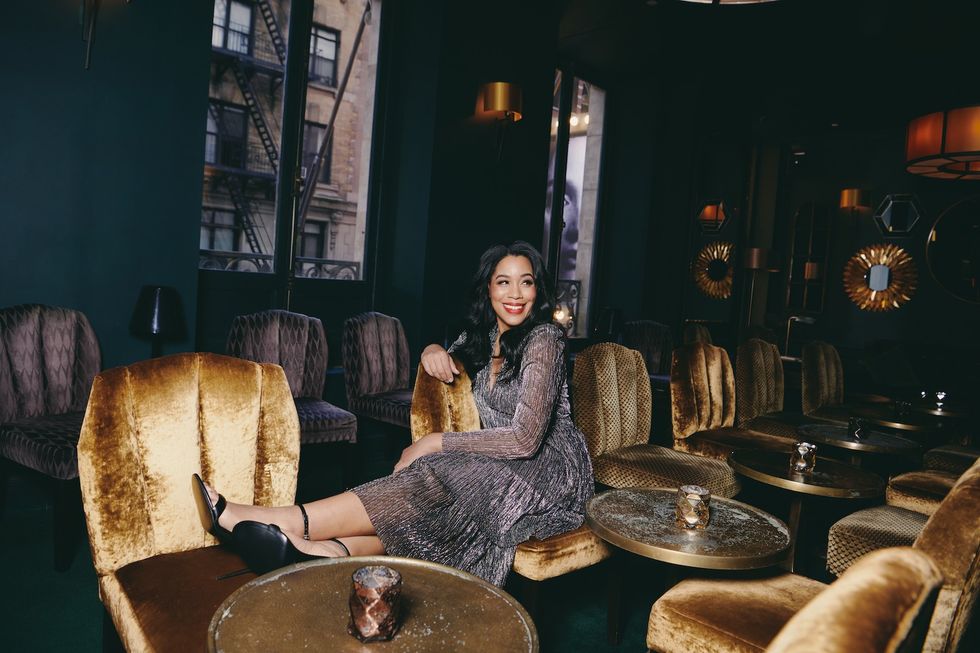
You might be familiar with Henrik Ibsen’s A Doll’s House, but the newest revival on Broadway (penned by Amy Herzog and starring Academy Award winner Jessica Chastain and Jesmille Darbouze) is ready to upend your expectations.
In the classic play, Jessica Chastain’s Nora quickly becomes disenchanted with her husband's behavior, and she must balance her role as wife and mother alongside her own secrets. Darbouze stars as Nora’s friend Kristine, who reappears at the same time Nora’s secrets are threatened.
Opening night of the show (March 9, 2023) was a full circle moment for Darbouze, a Long Island native. After joining shows like Kiss Me, Kate and Betrayal in 2019, she returned to nursing school when the pandemic shut down Broadway. After years away from her career of choice, she booked the role of Kristine in 2022.
Throughout her audition, Darbouze hoped to at least book an understudy role (someone who learns a role to fill in on short notice). When she actually booked Kristine, her first thought was “Are they sure?”
“In my mind, I was really prepared for them to either offer me the understudy because they’d probably go with someone with a bigger name,” she says. Although she’s been in the business since 2006, her path to success has had its ups and downs.
“I think for women, we have a history of things being exponentially harder for us, and there being less opportunity,” Darbouze says. “And then I have the added factor of being a woman of color in the industry as well, where there are not many roles available to us.”

Along with her admiring the "beautiful" work of her costars, Darbouze is inspired by how the theatre community rebuilt following the pandemic — which is one of the only times Broadway went fully dark — as well as those communities who are fighting for their voices to be heard.
Just like many fictional characters, Kristine’s journey parallels these real-world experiences. She is strong and grounded, and refuses to back down from what she wants her life to look like.
“I think this adaptation is much more accessible...it humanizes all of these characters in a way that we're not used to seeing,” Darbouze says. “[Kristine] is someone who, at the top of the show, is ready to change her life, and ready to advocate for herself in a way that she's been conditioned not to.”
Darbouze is no stranger to that feeling. “There's been a little bit of a stigma of asking for what you want, and then as a woman even more, because then you're either pinned as difficult or needy, or hard to work with, or whatever it could be.”
Women are constantly expected to appear pleasant and put-together, to present their lives in a picture-perfect way. But the women in A Doll’s House refuse to do that — a powerful statement considering the original play premiered before American women even had the right to vote. Kristine wears her heart on her sleeve and balances her fierce love with her persistence.
“Kristine is saying ‘[I] sacrificed so much I’m not doing it again,’ and that I really love,” Darbouze says. “I've been able to, not for the first time, but in playing this role, see the importance of self-advocacy.”
In addition to these emotional themes, the technical aspects of the show add a whole new complexity. The lighting choices, mixed with the actors’ blocking (namely, who quite literally overshadows whom) give an exaggerated visual aid that underscores the ominous tone of the plot.
There also aren’t any props or sets, requiring a different kind of awareness, both as a cast and audience member: “It's just you in the chair. There's no set, there's no props to hide behind. So it just sort of amplifies the importance of what we're saying, how we're saying it, and the importance of being connected to what we're saying.”
Herzog’s adaptation allows space for the actors to sit in Nora and Kristine’s friendship, and adding a whole new layer for female audience members.
After the show, Darbouze loves going to the stage door to sign programs and talk with audience members. “It's quite common that a lot of women are very emotional and in tears, and so moved by this piece, and what it awakens in them,” she says. “I think it does this beautiful job of self-reflection, especially for a woman, and then you connect that to whatever you might be experiencing in your life at this moment.”

Even though the plot is fictional, it touches on a variety of details within womanhood that resonate on a personal level. The bond between Nora and Kristine, and how they walk with one another through hardship, emphasizes how important community and real-world sisterhood is.
“I think it's more important than ever that women stick together and support each other and build each other up,” she says. “There's an unspoken bond, an understanding of what it is to be a woman in this world.”
“My female friendships, they ground me, they remind me what's important, they lift me up,” she continues. “I had a wonderful friend who did my makeup opening night. And she was such a great reminder saying, ‘You deserve to be here. You're exactly where you need to be, you worked so hard for this and embrace this moment.’ And I was in tears. So grateful that I had a female friend and a woman to say those words to me.”
Friends who speak truth in your life is something we all need — and the show highlights that truth as much as it does the sisterhood. “Being true to you and speaking your truth I think also frees you as an artist being true, especially being true to who you are and trusting that like that truth that you carry is enough, I think also influences your work,” she says.
“In truth lies freedom in so many different ways…There’s an artistic freedom, there's a personal freedom, there’s just like a spirit — like an openness that you can't allow yourself to access or be exposed to, unless you tap into that truth.”
You can see A Doll’s House through June 10, 2023 at The Hudson Theatre in New York City. You can keep up with Jesmille on Instagram, and check out our email newsletter for more exclusives like this!
Featured image via Emilio Madrid.
0 Commentaires